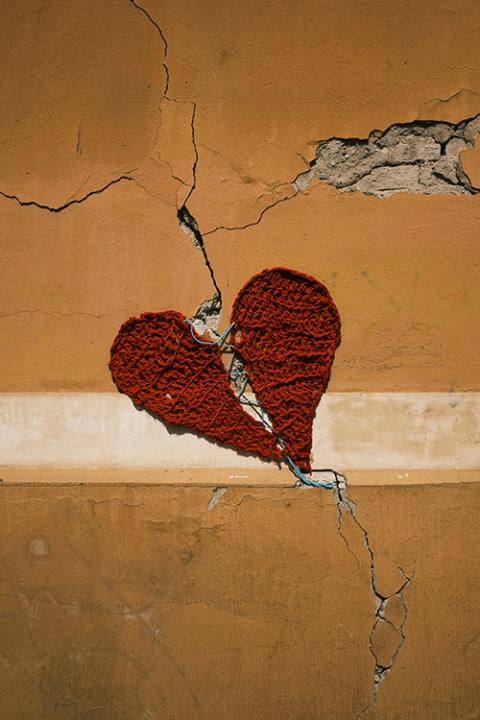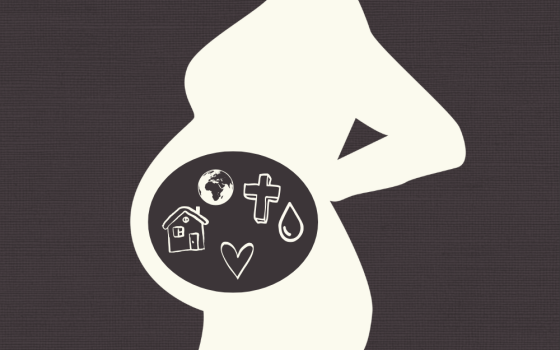
"Healing of Naaman" by Nicolaes de Bruyn (Wikimedia Commons/Rijksmuseum)
How are we to be healed? Often we have a very specific idea about what healing will look like, who is to heal us, what the outcome will be. But what if we are wrong?
Recently, I went to the early Mass at my church. As I walked into the small service, I was asked to do the readings for the day. I quickly scanned the lines as the entrance hymn began, trying to remember the correct pronunciation of the clusters of Old Testament names in the first reading.
It wasn't until I stood at the lectern and said the words out loud that I understood that this was a story about a bunch of people with very specific ideas about healing who got angry when their ideas were challenged or their expectations disappointed — rending-the-clothes enraged, storming-off-and-leaving angry.
How many of us think that we can dictate the terms of our physical, spiritual or emotional healing? How many of us carry ideas about who should heal us, how and in what time frame? I certainly do. These expectations can impede my progress because I can miss the actual invitations to new understandings that could lead to healing.
Advertisement
How many of us get angry when the path we prefer for healing in our family, community or political system doesn't unfold in the way we expected?
When we are asked for help in a manner that does not conform to our preconceived notions, are we gracious or do we balk?
In the story from the Second Book of Kings (5:1-14) Naaman, who has leprosy, goes to Israel to be healed. He presents his silver and gold to the king and asks for healing. The king is furious to be asked. Rending of clothing ensues.
Elisha sends a message telling the king to send Naaman his way. Naaman goes "with his horses and chariots" and Elisha's messenger tells Naaman to wash in the Jordan River and be healed.
Naaman is furious that the prophet sent a messenger, for he expected that Elisha would show up in person, call on God and "wave his hand over the spot, and cure the leprosy."
Naaman says there are rivers in his own country, why should he come all this way just to bathe in the Jordan? His servants tell him that if the prophet had asked for him to complete an arduous task he would have done it, so why not just bathe in the Jordan.
Spoiler alert — Naaman bathes in the Jordan and is healed.

(Unsplash/Ante Gudelj)
Can you think of a time when you were wrong about a person who was trying to help you?
I remember the therapist I went to see soon after my son died. He was tall, thin, quiet. I thought I had a panic disorder and needed medication that he, a psychiatrist, was meant to prescribe to stop my debilitating panic attacks. He thought the trauma of my son's accident and subsequent death was bringing up previous traumas and we should talk about it. I sat in his office with the delicate line drawings of birds on the wall and literally rolled my eyes.
He was right. I saw him for many years, and it was a life-changing process of healing and reintegration. I almost missed it because I was sure I had an easier solution.
Often people come to us for healing in a way that is unskillful or off-putting. Think of the awkward, inept attempt by a father who never learned to talk about his feelings to reach out to an estranged adult son. The teenager who makes dinner unexpectedly in an attempt to connect with his mother after an argument.
And how often do we dismiss sound advice because it isn't delivered from the right person, in the way we expect, or because we think it will be too uncomfortable?
I'm a recovering alcoholic, and I tried for years to control my drinking in a host of ineffectual attempts to drink socially, because I didn't want to try the complete abstinence that was, ultimately, the only way I could control my alcoholism.
Of course, healing can be difficult and messy. Rarely is it something as simple as a dip in the river. The reason that Naaman finally makes the healing dip is because his servants convince him. Which is another good reminder — do we have people around us who can tell us the truth? Do we ask them for input when we are trying to change our lives or bring healing to an area of brokenness? Do we listen to them?
Healing can be difficult and messy. Rarely is it something as simple as a dip in the river.
I continue with spiritual direction after more than a decade, because it is a specific time and place where I ask someone wiser than I am for guidance. And I often, even after all this time, balk at her suggestions. I want her to call on God, wave a hand and heal me — which isn't how it works. She will suggest ways to reframe my narratives, look at some of my unskillful ways of coping with discomfort and invite me to go and try something new.
In the rest of the chapter from Kings, Naaman does return to Elisha and acknowledges that Elisha was right. Naaman wants to give Elisha a gift — his expectation and narrative around reward is an exchange. Elisha refuses and tells Naaman to go in peace.
Maybe that's the reward for healing, for ourselves and for the people who helped us on our journey: to go in peace, carry peace with us, bring peace to others in whatever way we are called to do so.
And maybe we will go forth with fewer expectations, less anger and an openness to the unexpected ways in which we can grow and change, often in spite of ourselves.




